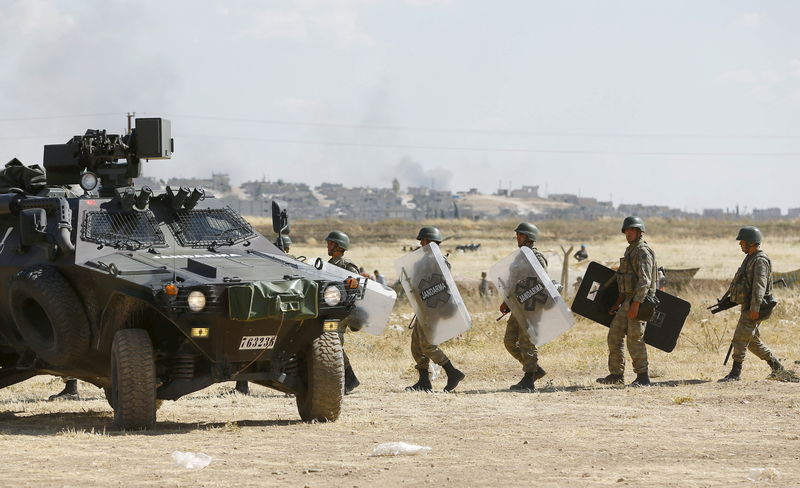By Faruk Yuce
KARKAMIS, Turkey (Reuters) - From his fields in Turkey, farmer Huseyin Ozdemir can see Islamist militants digging trenches and planting mines as they ready for battle around the northern Syrian town of Jarablus.
Like many villagers along this stretch of Turkey's 900 km (560-mile) border, Ozdemir welcomed the arrival of additional Turkish soldiers to bolster security in recent days but fears the consequences if they cross into Syria and intervene.
Wary of advances by both Syrian Kurdish forces and Islamic State militants as fighting north of the Syrian city of Aleppo intensifies, Turkey has sent extra troops and equipment to strengthen this part of the border as the risk of spillover rises.
On Sunday, it deployed missile and artillery batteries in the southeastern border town of Kilis. The border crossing was operating normally, with people and trucks queuing up to pass into Turkey.
Ankara has mooted the creation of a 'secure zone' on Syrian soil to prevent a new wave of refugees crossing the border, but has made clear it will not act alone and has been lobbying for support from the U.S.-led coalition against Islamic State.
"Islamic State (militants) are here. They plant mines on the Syrian border. They don't cross into our territory," Ozdemir said, tending his crops in the parched soil near the town of Karkamis, across the border from Jarablus.
"We want to see our soldiers present on the border but we don't want war. We don't want our soldiers crossing ... We will be satisfied if they just protect our borders."
Syrian government forces mounted heavy air strikes on Friday against rebel positions in and around Aleppo, the focus of an insurgent offensive aimed at capturing areas controlled by President Bashar al-Assad.
Turkish officials have said maintaining access to Aleppo is of critical importance and that Ankara would act if Syrian Kurdish forces battling Islamic State militants took control of Jarablus, some 120 km (75 miles) northeast of the city.
Ankara is wary of the creation of an autonomous Kurdish state in Syrian territory, fearing that would further embolden Turkey's own 14 million Kurds. Prime Minister Ahmet Davutoglu said on Friday there were no immediate plans for any incursion, but Turkey would respond if its security was threatened.
"THROAT-CUTTING GESTURES"
Up and down the border with Syria, Turks are growing increasingly frustrated at the violence spilling into their towns and villages. But the prospect of Turkish involvement in Syria's conflict remains deeply unpopular.
"Islamist militants are threatening us from the other side of the border. They make throat-cutting gestures," said Halil Kocaaslan in the village of Karanfilkoy, close to Karkamis.
"The presence of Turkish soldiers at the border gives us confidence but we don't want them to cross into Syria. That would be devastating," he said.
More than 1.8 million Syrians have fled to Turkey, including more than 20,000 mostly Arabs in recent weeks who were escaping fighting around the border town of Tel Abyad further east, where Kurdish-led forces have seized territory from Islamic State.
Officials in Ankara fear another million people could be displaced if fighting for Aleppo intensifies, and villagers like Kocaaslan are starting to wonder where they would go if the fighting spilled into Turkish territory.
"The people of Jarablus fled to Turkey. Where would we flee?" he said.
Last week Turkish newspapers carried reports that the government is considering creating a buffer zone across the border, days after Erdogan said Turkey would never allow the formation of a Kurdish state along its southern borders.
Plumes of smoke rose from burning scrubland around the low-rise concrete buildings of Jarablus on Saturday but it otherwise appeared largely quiet and there were no immediate signs of activity at a military outpost on the Turkish side.

"Turkish people, the people of this village do not want war. We absolutely do not want Turkish soldiers to violate the border and enter Syria," Kocaaslan said.